Forced labour reports
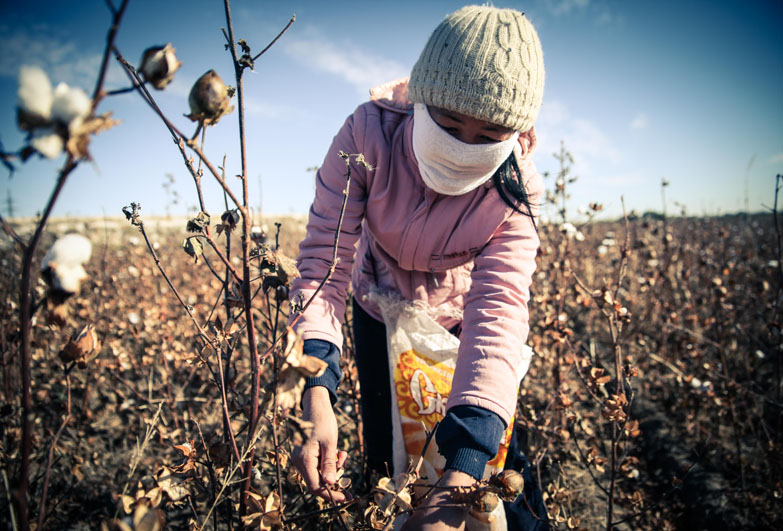
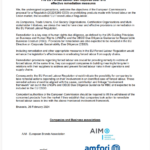
The EU Forced Labour Ban requires clear and effective remediation measures: Statement to the negotiators
As Companies, Trade Unions, Civil Society Organisations, Certification Organisations and Multi-Stakeholder Initiatives, we stress the need to have clear and effective provisions on remediation in the EU Forced Labour Regulation.
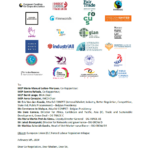
Open letter to the EU Forced Labour Regulators Negotiators
A letter, on behalf of the 33 undersigned civil society organisations and trade unions, to outline key issues that should be considered during the upcoming trilogues in order to make the proposed EU Forced Labour Regulation (FLR) a success.
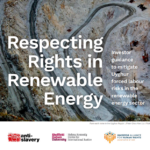
Uyghur Forced Labour in Green Technology
As the world continues to experience the devastating impacts of climate change, a full transition away from the fossil fuel economy is imperative. The solar and electric vehicle (EV) industries in particular, are critical to this transition. However, both industries have been heavily implicated in forced labour in the Uyghur Region, where the Chinese Government is systematically persecuting the native Uyghur and Turkic and Muslim-majority peoples. A central element of this persecution occurs through state-imposed forced labour.
Coordinated global action is needed to shift solar supply chains away from the Uyghur Region and prevent the solar and EV industries from becoming any more reliant on the Region than they currently are. A truly just transition from fossil fuels cannot be achieved as long the current reliance on the Uyghur Region remains.
With this objective in mind, Anti-Slavery International partnered with the Investor Alliance for Human Rights and the Helena Kennedy Centre for International Justice at Sheffield Hallam University to publish a series of reports to support key stakeholders in the clean energy transition to address forced labour of Uyghurs and other Muslim and Turkic-majority peoples in the production of green technology:
- For Investors: Respecting Rights in Renewable Energy Investor guidance to mitigate Uyghur forced labour risks in the renewable energy sector. This Guidance provides investment professionals with the tools to identify, exclude or engage businesses linked to human rights violations against the Uyghur people from their green energy portfolios. This Guidance also explores how investors can re-channel investments into companies which champion sustainability, innovation, and supply chain resilience.
- An accompanying annex to the Investor Guidance
- For Governments: Respecting Rights in Renewable Energy: Supporting Investment in Sustainable and Ethical Green Technologies: A policy brief to the UK Government. A coordinated and comprehensive response from governments and international institutions will be critical to helping investors and industries operationalise the changes necessary to shift the landscape of green energy production. As such, this policy brief includes recommendations on legislative and regulation actions to the UK Government to support a shift of clean energy supply chains away from the Uyghur Region. Although targeted to the UK Government, this policy brief includes recommendations which are applicable to other governments.
- For all readers: “Respecting Rights in Renewable Energy: Addressing forced labour of Uyghurs and other Muslim and Turkic-majority peoples in the production of green technology”. A summary of our findings and recommendations across the project.
You can also read our blog explaining the research, core recommendations and considerations for a just transition.
The project was funded through an open call for proposals by the Modern Slavery and Human Rights Policy and Evidence Centre (Modern Slavery PEC), which in turn is funded and supported by the UK Arts and Humanities Research Council (AHRC).
Photo credit: Peter Chou Kee Liu. Creative Commons license.
Out of Reach: Analysis of evidentiary standards in EU and US import bans to combat forced labour in supply chains
As the world’s largest single market, the European Union (EU) has an enormous opportunity to demonstrate global leadership in designing its instrument to address forced labour in corporate supply chains. This analysis by Anti-Slavery International and the European Center for Constitutional and Human Rights argues that a lower evidentiary threshold should be set in proposed EU Forced Labour Regulation.
General Approach on the proposed EU Forced Labour Regulation
Joint letter from civil society organisations and trade unions to urge the EU Council to speed up negotiations to adopt a General Approach on the proposed EU Forced Labour Regulation (FLR).
On October 16, 2023, the European Parliament’s lead committees, the Committee on Internal Market and Consumer Protection (IMCO) and the Committee on International Trade (INTA) adopted, with an overwhelming majority, their position on the proposed Regulation. This letter outlines four core elements that must be included:
- An evidentiary regime adapted to forced labour.
- Provisions on state-imposed forced labour.
- One-stop shop EU-wide complaints mechanism.
- Remediation.
SDG Summit Gap on Forced Labour, Trafficking and Child Labour
As the SDG Summit draws to a close, we observed a worrying lack of meaningful global leadership on issues of forced labour, child labour and trafficking. In reaffirming their commitments to the 2030 Agenda and the Sustainable Development Goals (SDGs), Anti-Slavery International, alongside 90+ sector organisations, urges Member States to:
- Reaffirm their commitment, in the strongest terms possible, to the full, effective, and meaningful implementation of SDG 8.7.
- Recognising that SDG 8.7 is deeply interconnected with achieving most of the SDGs, significantly increase your Government’s efforts to address the root causes of forced labour, modern slavery, human trafficking, and the worst forms of child labour, inter alia, poverty, discrimination, gender inequality, climate change, and conflict.
- Ensure that all efforts and deliberative and decision-making processes are survivor-led, centred, and informed, and commit to adopting multi-stakeholder and intergenerational partnerships to support prevention, protection, and prosecution efforts.
See here for the open letter sent to UN Ambassadors from 73 sector organisations on 21 September.
Letter to the G7 on the Just Transition and Uyghur Forced Labour
We, representatives of the global Uyghur community, investor groups, civil society organisations, trade unions, environmental organisations, and academics, are writing to you in advance of the G7 Ministerial Meetings and Leaders’ Summit in 2023 to urge for the adoption of concrete measures to combat the use of systemic forced labour in the global transition to clean energies.
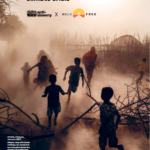
The Costs of the Climate Crisis
Anti-Slavery International co-authored an essay with Walk Free for the Global Slavery Index – see the original article here in the Global Slavery Index.
Compounding crises serve to heighten the risks of all forms of modern slavery. The COVID-19 pandemic, armed conflicts, and climate change have led to unprecedented disruption in employment and education, as well as increases in inequalities, distress migration, and reports of gender-based violence and forced marriage. Anti-Slavery International and Walk Free look at the connections between climate change and modern slavery and provide recommendations for governments.
Written evidence submission on Batteries for Electric Vehicle Manufacturing
Written evidence submitted by Anti-Slavery International to the Business, Energy and Industrial Strategy Committee in regarding Batteries for Electric Vehicle Manufacturing.
Anti-Slavery International welcomes the Business, Energy and Industrial Strategy Committee’s enquiry, which recognises the important role of electric vehicles (‘EV’) in the UK Government’s vital journey to net zero. However, we urge the Committee to recognise and assess the risk of the use of forced labour of Uyghurs and other Turkic and Muslim-majority peoples in the EV industry. Thus, this submission focuses on the question in the Call for Evidence “What are the risks to the UK automotive industry of not establishing sufficient battery manufacturing capacity in the UK?”
Written evidence submission on the risk of forced labour usage in critical minerals extraction
Written evidence submitted by Anti-Slavery International to the Foreign Affairs Committee to the Critical Minerals enquiry.
Anti-Slavery International welcomes the Foreign Affairs Committee’s enquiry, which recognises the important role of critical minerals in the UK Government’s green transition. In this enquiry, we urge the Committee to recognise and assess the risk of the use of forced labour of Uyghurs and other Turkic and Muslim-majority peoples in the mining and processing of critical minerals and manufacturing of
inputs made with critical minerals.
Thus, this submission focuses on the questions in the Call for Evidence which relate to responsible sourcing, diversification of supply chains and the role of the FCDO.
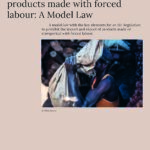
A Model Law for the proposed EU Regulation on Forced Labour
As the world’s largest single market, the EU has an enormous opportunity to set global leadership in its of design laws and approaches to address systemic forced labour in corporate supply chains. This EU toolbox of legislation and policy must include legislation which controls the trade and retail of products made with forced labour on the EU market. Alongside other measures, including mandatory due diligence legislation, a forced labour ban will act as a powerful government enforcement tool which incentivises companies to meaningfully address forced labour in their supply chains.
Anti-Slavery International, ECCHR and The Greens/EFA Group therefore welcome the European Commission’s “Proposal for a Regulation on prohibiting products made with forced labour on the Union market” (‘Regulation’), published on 14 September 2022. Yet to be effective, significant improvements must be made to the European Commission’s proposal.
To help shape the design of the Regulation, this document sets out a model law with the key elements which must be included in the European Commission’s proposal, in order to create a worker-centred Regulation. As the debate in the European Union continues, we urge all decision makers to consult with organisations representing workers around the world, to ensure that the Regulation is designed with their needs and interests at its core.
Addressing Forced Labour in Global Supply Chains
17.3 million people are estimated to be in forced labour in the private sector and 3.9 million in state-imposed forced labour. Tackling the root causes that drive this forced labour requires a toolbox of measures. In this brief we outline the measures that are needed to truly tackle forced labour in global supply chains.
Principles for strengthening measures on Supply Chains through the new Modern Slavery Bill
Following the UK government’s announcement of a new Modern Slavery Bill which aims to reduce the prevalance of modern slavery in supply chains, we, along with allies outlined the principles for strengthening measures on supply chains with this Bill.
There is huge potential for action by businesses to reduce modern slavery around the world. The Transparency in Supply Chains provision of the UK’s Modern Slavery Act 2015 led the world in addressing modern slavery in company supply chains. However, non-compliance and poor quality reporting has limited its effectiveness and it has become evident that additional legal approaches beyond reporting are necessary. The forthcoming bill is an opportunity to strengthen our legislation and give the UK the tools needed to prevent goods produced through forced labour entering UK supply chains.
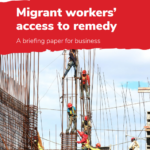
A Business Briefing on Migrant Workers' Access to Remedy
As an integral part of their workforce, in operations and supply chains, companies should take steps to make sure migrant workers’ rights are respected and upheld. This must include steps to improve access to effective remedy for migrant workers, including by understanding and addressing the underlying drivers of exploitation and barriers migrant workers face when seeking remedy. This report guides companies on how they can support migrant workers’ access to remedy.
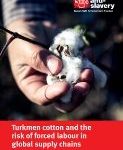
Turkmen cotton and the risk of forced labour in global supply chains
This report brings the strong links between Turkey and Turkmenistan to light. Being the 11th largest cotton producer in the world, Turkmenistan’s apparel and textile exports pose a significant risk of forced labour tainting global supply chains and present a challenge to brands’ due diligence. Anti-Slavery International has documented cases of Turkish enterprises that operate in Turkmenistan and claim to sell their products to well-known international brands. These links show that Turkey is acting as the main gateway for its cotton products to global supply chains, and brands should be aware of it.
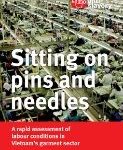
Sitting on pins and needles report
This report is a rapid assessment of labour conditions in Vietnam’s export-oriented textile and garment sector. The findings of the report, that highlight the risk of forced labour, child labour and child slavery, showcase the need for pan-European legislation that includes mandatory human rights due diligence at the EU level. As the second largest garment producer in Asia, and key trading partner of the EU, the Vietnam case was worth looking at. With Vietnam and the EU in the middle of negotiations on a future trade agreement, this study proves the EU should set higher standards for those it chooses to trade with.
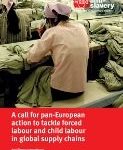
A call for pan-European action to tackle forced labour and child labour in global supply chains
This briefing for European policy makers outlines the increased risk of forced and child labour, in global supply chains of goods and services. It argues that extant national and EU law and policies are insufficient to eradicate slavery in supply chains, since they cover only specific sectors (such as conflict minerals or timber) or generic transparency requirements. Anti-Slavery International calls for a systematic, pan-European approach to tackling forced and child labour in global supply chains that includes binding due diligence, requiring businesses to proactively tackle human rights abuses throughout their supply chains.
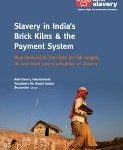
Slavery in India’s Brick Kilns & the Payment System: way forward in the fight for fair wages, decent work and eradication of slavery
Report revealing shocking levels of debt bondage and child slavery in brick kilns across Punjab. The report found that the recruitment and payment systems underpin this cycle of slavery, trapping seasonal migrant workers in bonded labour year after year, leaving women unpaid and not treated as workers, and encouraging child labour. It identified changing the piece-rate payment system into a time-based one, where workers are paid individually and regularly, as a systemic change that would help break the cycle of bonded and child labour.
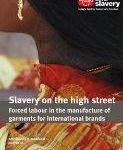
Slavery on the high street. Forced labour in the manufacture of garments for international brands.
Anti-Slavery International.
New report from Anti-Slavery International exposes how top UK high street brands are selling clothing made by girls in slavery in southern India. Our research has uncovered the routine use of forced labour of girls and young women in the spinning mills and garment factories of five Indian clothing manufacturers that supply major western clothing retail brands.
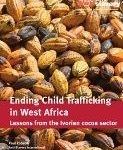
End Child Trafficking in West Africa: Lessons from the Ivorian cocoa sector
Anti-Slavery International, Paul Robson.
This report finds that trafficking of children to cocoa farms in Côte d’Ivoire still occurs. The research found significant numbers of young people in Mali and Burkina Faso who had worked as children in cocoa farms in Côte d’Ivoire in the last five years. The practices occur in the context of large-scale movements of people within the region including the trafficking of children to other agricultural activities and to other sectors.
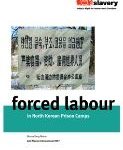
Forced Labour in North Korean Prison Camps
Anti-Slavery International, Norma Kang Muico.
This report focuses on returned North Korean migrants who are subjected to forced labour in North Korean prison camps following their deportation from China. The findings of the report are based on interviews carried out with North Koreans who were subjected to forced labour while in detention. The report includes photographs and 30 cases. Most of those interviewed were subjected to forced labour before being prosecuted, which violates international standards as well as North Korea’s domestic law. The report also outlines what measures need to be taken to address this situation (also available in Korean, see translations page)
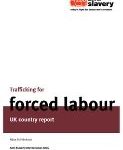
Trafficking for Forced Labour: UK Country Report
Klára Skrivánková, Anti-Slavery International
The result of research carried out by Anti-Slavery International between 2005 and 2006 with the aim of finding out more about trafficking for forced labour in the United Kingdom. This was a qualitative rather than quantative project, which aimed to provide information about how migrants become trafficked and which industries in the UK are affected. Also available an executive summary and policy recommendations.
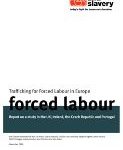
Trafficking for Forced Labour in Europe
Anti-Slavery International.
Report on a study in the UK, Ireland, the Czech Republic and Portugal This report looks at the various sectors and industries in which trafficking into forced labour occurs including agriculture, construction, domestic work and hospitality. Includes policy recommendations at a European level.
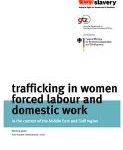
Trafficking in Women, Forced Labour and Domestic Work: In the Context of the Middle East and Gulf region
Anti-Slavery International.
This report investigates the experiences of women migrant domestic workers in the Middle East and Gulf, the dynamics and workings of the migration process and whether and how it contributes to trafficking. Also included is an examination of some of the key, inter-connecting dynamics between slavery, trafficking, migration and forced labour, focusing particularly on examples of sending, receiving and transit countries including Egypt, Ethiopia, Eritrea, Lebanon, Sudan and Yemen.
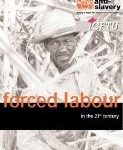
Forced Labour in the 21st Century
Anti-Slavery International, ICFTU.
This booklet highlights the main ways in which forced labour manifests itself internationally, including through slavery, bonded labour, trafficking and child labour. Case studies and pictures are provided throughout. ISBN: 0 9009 18 50 0.